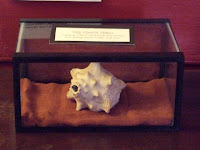

Following on the heels of this afternoon's 250th birthday celebration, the Amherst Historical Society and Museum held its Founders Night ceremony at the Jones Library in the evening. It was the occasion for the presentation of the third annual Conch Shell Award. Named after "the conch shell or 'ye kunk' that was used in he 1700s to call Amherst residents to town meeting and worship," the award serves "to recognize individuals who have made valuable contributions to the preservation and appreciation of Amherst history."
Amherst Historical Society President Elizabeth Sharpe opened the event with some anecdotes and observations on the peculiar early history of Amherst and its government, drawn from the Colonial records.
Ruth Owen Jones introduced Conch Shell Award Recipient James Avery Smith. Smith, who for many years held the post of Town Engineer, is a man of seemingly boundless energies and interests: a sometime minister, Town Meeting member, and accomplished genealogist. He is known in particular for his research into the history of Amherst's cemeteries (his maps of the plots in historic West Cemetery are an indispensable resource) and his books on Families of Amherst (1984) and History of the Black Population of Amherst, Massachusetts, 1728-1870 (1999).
Smith took the opportunity to announce that, by means of careful calculations based on historical records, he had at last identified the location of the famed but mysterious "Hartling Stake," a marker from which distances were measured in the Colonial era. Thus, for example, the first Town Meeting of the Third Precinct in 1735 decreed that the meeting house was to be located near the Hartling Stake. Hadley highway No. 6 in 1754 is described as at one point running "thence S. 11 o W 20 rods to the 'Hartling Stake' on S. side of road," and so forth. A pin with plastic flag now marks the location in the pavement near the Amherst Cinema.
History Museum Director Pat Lutz introduced the presenter of the Mabel Loomis Todd lecture, Amherst College historian Kevin Sweeney. Kevin spoke on the topic of "Jeffery Amherst: the Very Model of a [Modern] Major General," elaborating on the analysis that he presented in Amherst Magazine last December. The impetus for the research, he explained, derived from a talk that he was asked to deliver on the occasion of the 250th anniversary of Williamstown. The early history of the French and Indian War drew him, via that of soldier and college founder Ephraim Williams, to that of Jeffery Amherst.

Here, as in the article, he focused on the apparent enigma of the man who seemed personally inept or awkward ("really a very boring person") yet excelled in employing the most modern European military techniques in the Colonial theater of war. The lecture provided Sweeney with an opportunity to explain in greater detail the history of both Amherst's campaigns and his tactics in the Seven Years' War, arguments illustrated with contemporaneous art and photographs of the modern sites. Part of his point was that Amherst's methodical approach and command of logistics paved the way for the modern American way of war: careful planning, ample supplies, and massive force.
Logistical expertise, he acknowledged in the question-and-answer session, had its limits. If, on the one hand, the calm and unglamorous Eisenhower could claim much of the credit for the success of D-Day, William Westmoreland's expert application of logistics, mobility, and superior firepower did not bring about triumph in Vietnam. The most dramatic point in the Q & A came when someone asked the inevitable question about Amherst's plan to kill Indians with smallpox-infected blankets. In this case, however the question was more about the future than the past: How could the town continue to bear the name of such a man? Kevin, an acknowledged expert on Native American history, stated simply that, by retaining historic names, we remind ourselves of the need to recall our entire history rather than sift it selectively. The name of Amherst reminds us, for example, that it was British troops and modern European military methods, rather than the young George Washington, et al., and some mythical frontier fighting tactics, that won the war. And the name Amherst reminds us of moral issues and obligations, as well. He forcefully and appropriately dismissed the shallow and self-congratulatory tendency "to do nice things for 'dead Indians'--but neglect Native Americans alive today."




No comments:
Post a Comment